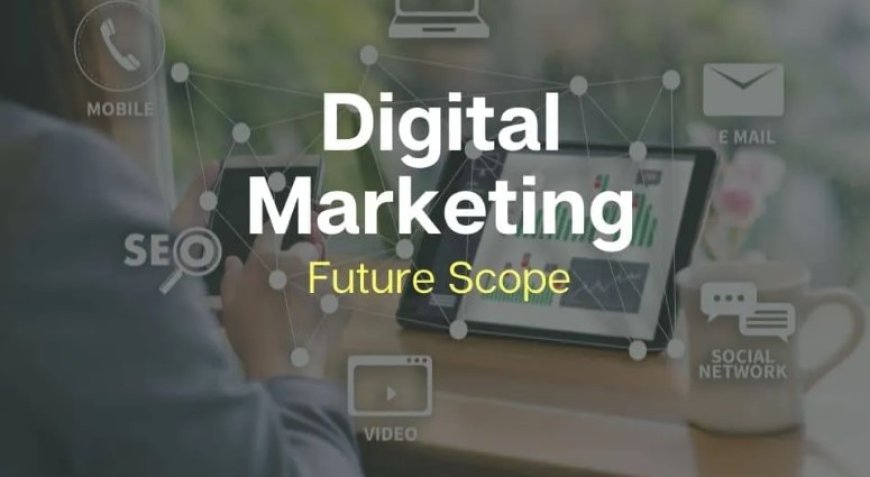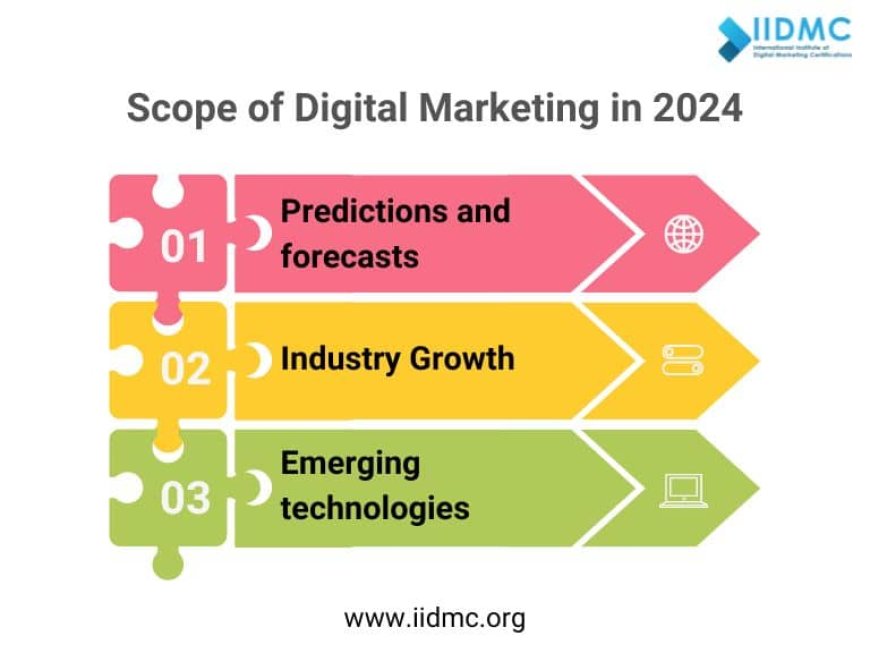The Scope Of Digital Marketing
Discover the vast opportunities and impact of digital marketing. Learn about key strategies and trends shaping the future of online promotion for businesses.

As we enter 2024, the digital advertising market continues to change at a rapid pace, bringing new problems and opportunities for marketers throughout the world. The scope of digital marketing is rapidly expanding, owing to technical breakthroughs, shifting consumer behaviors, and the continuous digital revolution across industries. This dynamic industry is becoming increasingly important for firms looking to acquire a competitive advantage and better engage with their target customers.
We will look at the major trends that are shaping the scope of digital marketing in 2024. From the integration of AI and machine learning technologies to personalized marketing techniques and the advent of voice and visual search, we'll look at how these advances are changing the way brands communicate with customers. In addition, we will examine the growing importance of data privacy and ethical marketing in establishing trust and keeping client loyalty in a digitally connected society.
Current Trends in Digital Marketing
1. Social Media Marketing
For brands that want to interact with their audience directly, social media platforms like Facebook, Instagram, and Twitter have become essential. Social media marketing enhances client loyalty and retention by facilitating personal and engaging connections with users, going beyond simple advertising. With the use of these platforms' accurate targeting tools, marketers may target particular demographic groups according to a variety of criteria, including location and interests. Establishing deep connections and encouraging a feeling of community among users are the objectives.
2. Content Marketing
This strategy focuses on developing and sharing great content to attract and maintain a certain target audience. Instead of simply selling things, businesses supply relevant information through blogs, videos, and infographics, assisting customers in problem-solving and learning new information. Effective content marketing not only increases brand visibility but also positions the organization as a thought leader in its sector, increasing consumer trust and engagement.
3. SEO Strategy
Search Engine Optimization (SEO) is essential to increasing online visibility. It entails improving website content and structure to rank higher in search engine results pages (SERPs). Businesses improve their site's exposure by incorporating relevant keywords, enhancing site usability, and assuring fast load times, resulting in organic traffic and a better user experience, which is critical for conversion.
4. AI and Automation
Through operational efficiency and user experience personalization, automation, and artificial intelligence are transforming digital marketing. AI technologies provide advanced customer segmentation and predictive analytics, while automation solutions manage repetitive operations like email marketing and social media administration. By enabling marketers to deliver more personalized content, these tools not only boost productivity but also have the potential to dramatically raise engagement and conversion rates.
Scope of Digital Marketing in 2024
-
Predictions and forecasts: Experts estimate that the scope of digital marketing will increase further in 2024, with global spending on digital advertising reaching new highs.
-
Industry Growth: The digital marketing business is expected to grow significantly, owing to reasons such as smartphone proliferation, e-commerce expansion, and increased acceptance of digital technology.
-
Emerging technologies: Virtual reality (VR), augmented reality (AR), and voice search are all intriguing technological breakthroughs that allow marketers to build immersive and interactive consumer experiences.

Challenges of Digital Marketing
1. Privacy Concerns
As concerns about data privacy and security grow, marketers have hurdles in acquiring and using consumer data ethically and responsibly.
2. Data Regulations
Stringent rules, such as the General Data Protection Regulation (GDPR) and the California Consumer Privacy Act (CCPA), create compliance issues for marketers by requiring companies to follow tight guidelines when handling client data.
3. Competition
The digital world is getting more competitive, with firms competing for consumers' attention in a crowded marketplace. To remain competitive, marketers must consistently innovate and distinguish their strategies.
Strategies for Success: Adapting to the Future of Digital Marketing
1. Stay Updated: To make sure your strategies are still applicable and successful, stay up to date on the newest developments in digital marketing trends and technologies.
2. Focus on Personalization: Use AI and data to create experiences and content that are tailored to your target audience's preferences.
3. Try New Platforms: To stay competitive and reach new audiences, investigate newly developed digital channels and social media platforms.
4. Invest in Education and Training: To stay ahead of the curve and successfully use new technology, your workforce has to get ongoing training and upskilling.
5. Collaborate and Innovate: To promote experimentation and adaption to new trends and technologies, cultivate an innovative and collaborative culture within your company.
What role does content marketing play in the digital marketing?
Digital marketing is not complete without content marketing, which is a strategic strategy that focuses on producing and disseminating worthwhile, timely, and consistent material to draw in and hold on to a specific audience and, eventually, encourage profitable consumer behaviour. Content marketing strives to build expertise, increase brand awareness, and keep your company at the top of consumers' minds, in contrast to traditional marketing strategies that could concentrate on direct sales offers. Companies may establish a stronger bond with their audience and increase trust and loyalty by providing material that is helpful and interesting.
Moreover, content marketing facilitates the use of other digital marketing platforms. It supplies content for posting on social media, boosts keyword optimization, and builds natural backlinks, which helps SEO. It also powers email marketing campaigns by supplying content that can be shared directly with subscribers. This combination assists in creating a strong online presence in addition to increasing the marketing strategy's efficacy. Higher consumer engagement levels, better conversion rates, and more organic search traffic can result from the judicious application of content marketing. All things considered, content marketing is an essential component of a strong digital marketing strategy because it is not only a method but also a long-term strategy that builds relationships with consumers.
As 2024 approaches, digital marketing is still an important and evolving industry for companies looking to prosper in the competitive digital market. AI, VR, and advanced data analytics are examples of emerging technologies that are completely changing the way businesses interact with their customers. Concurrently, the significance of ethical conduct and data confidentiality keeps increasing, impacting tactics and customer confidence. Marketers may effectively navigate these shifts by embracing trends like tailored content, investigating new platforms, and making a commitment to ongoing learning and innovation. Crucial to this development is content marketing, which keeps boosting engagement and fostering deep connections online.





























